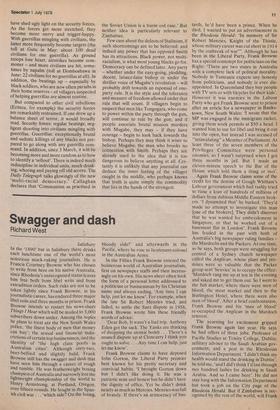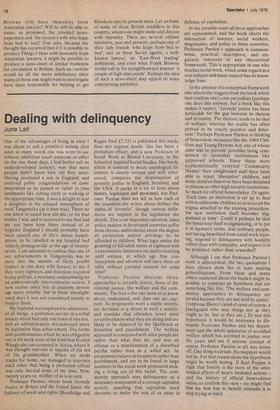Swagger and dash
Richard West
Salisbury In the '1890' bar in Salisbury there drinks each lunchtime one of the world's most notorious muck-raking journalists. He is Francis Courtney Browne who has chosen to write from here on his native Australia, since Rhodesia's unrecognised status leaves him free both from libel writs and from extradition orders. Such risks are not to be taken lightly since Frank Browne, in his Journalistic career, has endured three major libel suits and three months in prison. Frank Browne intends to restart his news-sheet Things I Hear which will be mailed to 3,000 subscribers down under. Among the topics he plans to treat are the New South Wales police, 'the finest body of men that money can buy'; the sexual and financial indiscretions of certain top businessmen, and the Identity of 'the high class poofs in Australian cities'. Although sixty-two, beer-bellied and slightly bald, Frank Browne still has the swagger and dash that have seen him through a career of rough and tumble. He was featherweight boxing champion of Australia and narrowly lost the lightweight championship of the world to Henry Armstrong, at Portland, Oregon, over fifteen rounds. He fought in the Span. ish civil war. . . 'which side? On the losing,
bloody side!' and afterwards in the Pacific, where he rose to lieutenant-colonel in the Australian Army.
In the Fifties Frank Browne entered the boisterous world of Australian journalism, first on newspaper staffs and then increasingly on his own. His news-sheet often took the form of a personal letter addressed to a politician or businessman by his Christian name and always ending, 'Any time I can help, just let me know'. For example, when the late Sir Robert Menzies tried, and failed, to settle the Suez dispute in 1956, Frank Browne wrote him these friendly words of advice: 'Dear Bob, It wasn't a bad trip. Anthony Eden got the sack. The Yanks are thinking of dropping the atomic bomb. . . There's a council dispute up at Cloncurry I think you ought to solve. . . Any time I can help, just let me know'.
Frank Browne claims to have deposed John Gorton, the Liberal Party premier best known for his pretty secretary and convivial habits. 'I brought Gorton down but I didn't like doing it. He was a patriotic man and honest but he didn't have the dignity of office. Yet he didn't drink nearly as much as Menzies. Menzies was full of brandy. If there's an aristocracy of bas tards, he'd have been a prince. When he died, I wanted to put an advertisement in the Rhodesia Herald: 'In memory of Sir Robert Menzies, Knight of the Thistle, whose military career was cut short in 1914 by the outbreak of war'''. Although he has been in the Liberal Party, Frank Browne has a special contempt for politicians on the Right: 'There are two states in Australia with a complete lack of political morality. Nobody in Tasmania expects any honesty from politicians, and nobody is ever disappointed. In Queensland they buy people with TV sets or with bicycles for their kids'. However it was enemies in the Labour Party who got Frank Browne sent to prison after an article for a newspaper in Bankstown, New South Wales: 'I wrote that the MP was engaged in the immigrant racket, giving them work permits at $50 a head. I wanted him to sue for libel and bring it out into the open, but instead I was accused of "intimidating" a Member of Parliament. At least three of the seven members of the Privileges Committee were personal enemies, so I wasn't surprised when I got three months in jail. But I made an eleven-minute speech to the Bar of the House which told them a thing or two'.
Again Frank Browne claims some of the credit for the demise of Gough Whitlam's Labour government which had rashly tried to raise a loan of hundreds of millions of dollars from dubious Middle Eastern brokers. 'I dynamited that' he barked. 'They'd made no attempt to investigate this man [one of the brokers]. They didn't discover that he was wanted for embezzlement in Singapore, or that he worked out of a basement flat in London'. Frank Browne has feuded in the past with both of Australia's big newspaper ruling families — the Murdochs and the Packers. At one time, so he says, both groups 'were struggling for control of a Sydney church newspaper called the Anglican, whose plant and premises were so valuable that the Packer group sent 'heavies' in to occupy the office: 'Murdoch rang me up at ten in the evening and asked me to get them out. So I went to the fish market, where there were men of blood, the meat market and then to the Burlington Hotel, where there were also men of blood'. After a brief confrontation, Frank Browne and his 'men of blood' re-occupied the Anglican in the Murdoch interest.
The yearning for excitement gripped Frank Browne again last year. He says he had offers of three jobs: Professor of Pacific Studies at Trinity College, Dublin; military adviser to the Saudi Arabian gov ernment; and a post in the Rhodesian Information Department. 'I didn't think my health would stand the drinking in'Dublin', he told me, 'and I did't think I'd last through two hundred lashes for drinking in Saudi Arabia. And so I came here'. He did not
stay long with the Information Department but took a job on the City page of the Rhodesia Herald. But if Zimbabwe is recognised by the rest of the world, will Frank
Browne still have immunity from Australian lawyers? Will he still be able to name, as promised, the crooked newspapermen and the tycoon's wife who leaps from bed to bed? One asks, because the thought has occurred that if it is possible to produce Things I Hear with immunity from Australian lawyers, it might be possible to produce a news-sheet of similar frankness for circulation in Britain. Such an exercise would be all the more satisfactory since many of those one might want to investigate have been responsible for helping to get
Rhodesia into its present mess. Let us think of some of those British meddlers in this country, whom one might name and discuss with impunity. There are several cabinet ministers, past and present; perhaps one of their lady friends 'who leaps from bed to bed'; two or three Soviet agents; a wellknown lawyer; an 'East-West trading' nobleman, and even what -Frank Browne would call in his straightforward manner 'a couple of high-class poofs'. Perhaps the idea of such a news-sheet may appeal to some enterprising publisher.







































 Previous page
Previous page